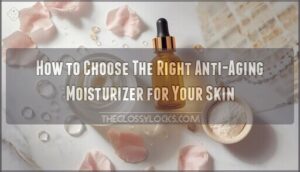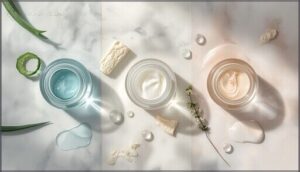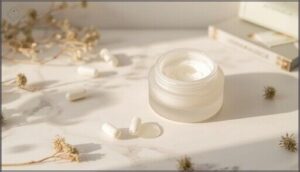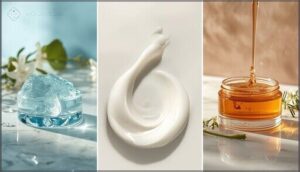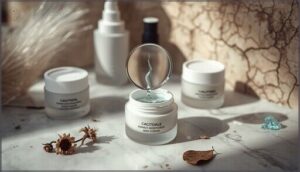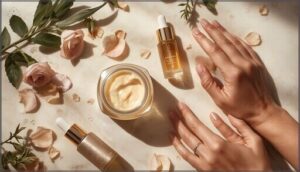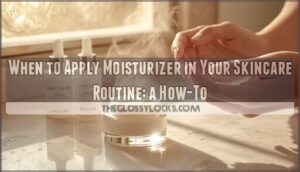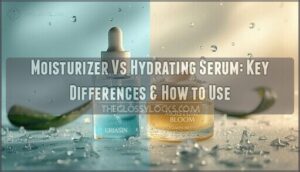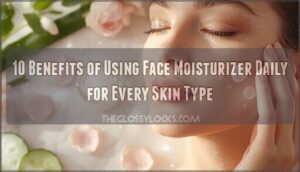This site is supported by our readers. We may earn a commission, at no cost to you, if you purchase through links.
Your skin loses about 1% of its collagen each year after age 30. That slow decline shows up as fine lines, dullness, and texture changes that no amount of makeup can hide. Most people respond by grabbing the first anti-aging moisturizer they see, but skin type matters more than marketing claims.
A gel formula that works wonders for oily skin can leave dry skin flaking by noon. The right moisturizer strengthens your skin barrier with ceramides, pulls in moisture with humectants like hyaluronic acid, and delivers active ingredients like retinol or peptides that your skin can actually absorb. Matching formulation to your specific needs determines whether you’ll see real results or just waste money on products that sit unused in your cabinet.
Table Of Contents
- Key Takeaways
- What Makes an Effective Anti-Aging Moisturizer?
- How to Match Moisturizer to Your Skin Type
- Essential Ingredients for Anti-Aging Benefits
- What to Avoid in Anti-Aging Moisturizers
- Tips for Choosing The Right Anti-Aging Moisturizer
- Frequently Asked Questions (FAQs)
- How do I choose the right anti-aging cream?
- What is considered the most effective anti-aging cream?
- What is the best moisturizer for aging skin?
- Should you use a moisturizer if you have aging skin?
- Are there any anti-aging moisturizers for 40s & 50s?
- Which anti aging cream should I use?
- What makes a good moisturizer?
- What should I look for in moisturizer for aging skin?
- How to find the right anti-aging cream?
- What’s the best Moisturiser for anti-ageing?
- Conclusion
Key Takeaways
- Skin type determines which moisturizer formula works best—gel textures suit oily skin while dry skin needs ceramide-rich creams to prevent flaking and irritation.
- Effective anti-aging moisturizers combine humectants like hyaluronic acid for hydration, occlusives like ceramides for barrier protection, and proven actives like retinol or peptides that actually penetrate skin.
- Daily broad-spectrum SPF 30 or higher prevents up to 80 percent of facial aging by blocking UV damage to collagen and elastin, making sunscreen your most powerful anti-aging tool.
- Avoid fragrance allergens, drying alcohols, and misleading marketing claims like “reverses years of damage”—focus instead on ingredient lists with clinically proven compounds at effective concentrations.
What Makes an Effective Anti-Aging Moisturizer?
Not all anti-aging moisturizers are created equal. The best products combine ingredients that hydrate your skin, protect against damage, and support your skin’s natural barrier.
If you’re not sure where to start, these top-rated anti-aging moisturizer reviews break down which formulas actually deliver results.
Understanding what to look for helps you choose a moisturizer that actually produces effects.
Key Ingredients to Look For
Start by scanning the ingredient list for proven actives. Look for compounds that deliver real antiaging results rather than empty promises.
- Hyaluronic acid binds up to 1,000 times its weight in water for instant plumping and lasting hydration
- Peptides signal your skin to produce more collagen and elastin, improving firmness over time
- Retinol speeds cell turnover to smooth texture and fade fine lines
- Ceramides repair your barrier to lock moisture in and keep irritants out
- Antioxidants like vitamin C neutralize free radicals from UV and pollution before they damage collagen
Experts also emphasize the importance of choosing products with for maximum results.
How Moisturizers Address Aging Skin
Moisturizers tackle aging skin through three main pathways.
They strengthen your skin barrier by replacing ceramides and fatty acids that decline with age, which slows water loss and keeps skin supple. Humectants like hyaluronic acid draw moisture in so fine lines look softer.
Regular use also improves texture by filling microscopic gaps between cells, giving you smoother, more radiant skin. For more insights, explore the science behind effective ingredients for aging skin.
The Role of Sunscreen in Anti-Aging
Daily sun protection stands as your most powerful anti-aging tool. Ultraviolet radiation drives up to 80 percent of facial aging—wrinkles, rough texture, uneven tone—so broad-spectrum SPF 30 or higher blocks both UVA and UVB damage. Look for water resistance and hypoallergenic formulas.
A moisturizer with built-in sunscreen simplifies your routine while guarding collagen, elastin, and tone from ongoing UV damage.
How to Match Moisturizer to Your Skin Type
Your skin type determines which moisturizer will work best for anti-aging benefits. Oily skin needs different ingredients than dry or sensitive skin to avoid breakouts or irritation.
For instance, choosing the right face skin care products with retinol or hyaluronic acid can target fine lines while matching your specific skin needs.
Here’s how to choose a formula that matches your specific needs.
Choosing for Oily, Dry, or Combination Skin
Your skin type drives your moisturizer selection more than any other factor. Oily skin thrives with lightweight gel formulas that absorb fast, while dry skin needs rich creams packed with ceramides and occlusives. Combination skin requires a strategic approach—often using different products in different zones. Here’s what dermatologists recommend for each skin type:
- Oily skin: Choose oil-free, noncomedogenic gel-creams with hyaluronic acid and mattifying ingredients like silica
- Dry skin: Pick thick, fragrance-free creams containing ceramides, petrolatum, or shea butter for barrier repair
- Combination skin: Apply lightweight lotions overall, or “zone” with gel on your T-zone and richer cream on cheeks
- Oily T-zone management: Look for labels mentioning “matte finish” or zinc PCA to control excess sebum
- Anti-aging for all types: Prioritize water-based formulas with peptides and antioxidants that won’t clog pores
Reading product texture descriptions helps narrow your skin care routines quickly. Gel-to-cream formulas suit most combination skin concerns without piling under makeup.
Options for Sensitive or Allergic Skin
If you react to cosmetics easily, your safest bet is a fragrance-free, hypoallergenic moisturizer designed for sensitive skin. Look for barrier repair formulas with ceramides and glycerin that skip common allergens like perfumes and dyes.
Dermatologist recommendations often point to noncomedogenic products with minimal ingredient lists. Before committing, patch test any new moisturizer on your inner arm for seven days to check for delayed reactions.
Moisturizer Textures and Absorption Rates
Texture dictates how fast a moisturizer sinks in and how your skin feels afterward. Gels absorb within seconds because they’re mostly water, while cream textures sit longer and seal in hydration overnight.
Match absorption speed to your daily routine and climate.
- Gel moisturizers work best for oily or acne-prone skin that needs quick, non-greasy hydration
- Lotions offer balanced absorption rates for normal or combination skin types
- Balms and oils stay on the surface to lock moisture into very dry, mature skin
Essential Ingredients for Anti-Aging Benefits
Not all ingredients deliver real anti-aging results. The most effective moisturizers contain specific compounds that work at different levels of your skin.
Here’s what dermatologists recommend looking for on product labels.
Humectants for Hydration (e.g., Hyaluronic Acid, Glycerin)
Humectants like hyaluronic acid and glycerin pull water into your skin’s outer layers, giving you that plump, smooth look. Hyaluronic acid can bind roughly 1,000 times its weight in water, while glycerin creates a moisture-attracting layer that reduces water loss.
In low humidity, pair these hydration heroes with richer moisturizers to prevent them from drawing too much moisture from deeper skin layers.
Occlusives and Emollients (e.g., Ceramides, Squalane)
While humectants draw water in, occlusives and emollients keep it there and smooth rough patches. Occlusives like petrolatum can cut water loss by nearly 99 percent, while emollients such as ceramides and squalane fill tiny cracks between cells for softer, more resilient skin.
Here’s what these barrier-repair ingredients do for you:
- Ceramides rebuild the “mortar” between skin cells, lowering water loss and keeping irritants out.
- Squalane gives a silky, non-greasy feel that won’t clog pores, ideal for oily or acne-prone skin.
- Petrolatum and mineral oil form a protective seal, especially helpful at night or in cold, dry weather.
- Plant butters and fatty alcohols smooth texture, making fine lines from dryness less obvious.
For best results, layer occlusives over damp skin or a lighter product like one with hyaluronic acid or glycerin. This traps moisture instead of just sitting on the surface.
Antioxidants, Peptides, and Retinol
Beyond hydration alone, antioxidants like vitamin C and E neutralize free radicals from UV and pollution that accelerate fine lines.
Peptides signal your skin to produce more collagen, supporting firmness without irritation.
Retinol remains the benchmark for smoothing wrinkles, though you’ll want to start with 0.01 to 0.3 percent and use it at night with broad-spectrum SPF 30 sunscreen during the day.
What to Avoid in Anti-Aging Moisturizers
Not all ingredients in anti-aging moisturizers help your skin. Some can cause irritation, dryness, or allergic reactions that make aging signs worse.
Here’s what you should avoid when choosing your moisturizer.
Common Irritants and Allergens
Even products marketed as gentle can trigger reactions. Fragrance allergens top the list—present in about 68% of moisturizers—causing redness and rash in sensitized skin. Preservative reactions from parabens and formaldehyde-releasers affect up to 10% of patch-tested patients. Essential oil irritation, lanolin sensitivity, and vitamin allergies also occur.
Dermatologists recommend hypoallergenic formulas after a skin assessment if you have sensitive skin or a compromised skin barrier.
Overly Harsh or Drying Ingredients
Some ingredients strip more than they smooth. Drying alcohols like alcohol denat appear in lightweight antiaging products to speed absorption, but regular use weakens your barrier and makes fine lines more visible. Harsh surfactants and high pH cleansers lift natural oils, leaving skin tight after washing.
Dermatologists warn that overusing strong exfoliants or penetration enhancers disrupts barrier lipids, causing dryness that no hypoallergenic moisturizer can fully reverse.
Misleading Marketing Claims
Beyond harsh formulas, label deception steers you toward products that sound scientific but deliver basic hydration. Dermatologists warn against fake claims like “reverses years of damage” or “gene-targeting technology” on antiaging products—phrases with no medical definition. Misleading ads pair luxury packaging with drugstore ingredient lists, and deceptive packaging highlights “clinically proven” results from tiny brand-run tests instead of independent trials.
Watch for these red flags when selecting antiaging products:
- “Reduce the appearance of wrinkles” – Brands dodge guarantees by promising temporary plumping, not structural change
- “Boosts collagen production” – Most topical collagen molecules can’t penetrate deeply enough to replace lost structural support
- “Dermatologically tested” – Only confirms a dermatologist was involved; doesn’t prove safety or effectiveness for your skin type
- “Clean” or “non-toxic” – Marketing terms without legal standards, applied differently across brands
- Sky-high prices – Luxury moisturizers often contain the same humectants and emollients as affordable options; you’re paying for branding
Tips for Choosing The Right Anti-Aging Moisturizer
Choosing the right anti-aging moisturizer doesn’t have to feel overwhelming. You just need a clear framework that matches your skin’s needs with proven ingredients.
Here are three practical tips to guide your selection process.
Future Global Energy Mix
Your skin care routine mirrors the global shift to sustainable energy—both demand strategic planning for long-term benefits. Dermatologists recommend that choosing an antiaging moisturizer requires the same foresight nations apply when building a low carbon future.
Look for products with renewable energy-tested ingredients that guarantee energy security for your skin’s sustainable future. Quality antiaging products deliver results when you commit to consistent use.
Community-Led Sustainability Initiatives
Just as communities build green spaces and support waste reduction through local gardens, your skincare routine thrives when you seek out antiaging product reviews from trusted sources.
Dermatologists recommend reading independent moisturizer tests before purchasing expensive antiaging skincare products. Look for skin care tips from board-certified experts who explain how ingredients support skin rejuvenation, ensuring your sustainable living approach extends to smart product choices.
Climate Change Policy Impact
Beyond broad spectrum SPF 30 protection with water resistance for daily skin health, sustainable development in antiaging skincare products mirrors effective climate governance—both demand transparency and measurable outcomes.
- Look for carbon pricing equivalents: clear ingredient percentages that prove efficacy
- Choose renewable energy approaches: formulas supporting natural skin barrier renewal
- Verify emissions reduction claims: proven results over vague antiaging promises
- Support brands practicing climate governance through ethical, science-backed testing
Frequently Asked Questions (FAQs)
How do I choose the right anti-aging cream?
You might think slathering on the priciest jar guarantees results, but choosing an effective anti-aging moisturizer depends on your skin type, proven actives like retinol or vitamin C, and broad-spectrum SPF.
What is considered the most effective anti-aging cream?
The most effective anti-aging cream combines daily broad-spectrum SPF 30+ sunscreen with proven actives like retinoids, peptides, niacinamide, and hyaluronic acid that support collagen production and skin barrier function consistently.
What is the best moisturizer for aging skin?
The best moisturizer for aging skin contains retinol or peptides to support collagen, plus ceramides and hyaluronic acid to hydrate deeply, addressing wrinkle treatment and anti aging benefits simultaneously.
Should you use a moisturizer if you have aging skin?
Yes, you should use a moisturizer daily if you have aging skin. Aging skin produces less sebum and loses moisture faster, so regular moisturizer keeps it hydrated, smoother, and more comfortable.
Are there any anti-aging moisturizers for 40s & 50s?
You’re not locked into the same routine forever—your skin’s needs shift with age.
Moisturizers designed for mature skin care in your 40s and 50s target slower cell turnover, dryness, and collagen loss with peptides, ceramides, and retinol.
Which anti aging cream should I use?
Start with a gentle cleanser, a moisturizer for your skin type, and daily SPF If fine lines concern you, add a low-dose retinol night cream paired with hydrating ingredients.
What makes a good moisturizer?
Like a shield guarding your skin’s outer wall, a good moisturizer delivers hydration with humectants like hyaluronic acid, seals it with ceramides, and fortifies your skin barrier while feeling comfortable enough to use daily.
What should I look for in moisturizer for aging skin?
Look for moisturizers with hyaluronic acid and glycerin to hydrate aging skin, and ceramides to support the barrier.
Additionally, seek out active ingredients like retinol or peptides to address fine lines and improve texture.
How to find the right anti-aging cream?
Find an anti-aging cream that pairs hyaluronic acid or glycerin with ceramides to hydrate and support your skin barrier.
Add retinol or peptides if you want firmer texture and fewer fine lines over time.
What’s the best Moisturiser for anti-ageing?
Hyaluronic acid holds up to 1,000 times its weight in water. The best antiaging moisturizer combines hydration, barrier repair, and actives like retinol or peptides suited to your aging skin concerns.
Conclusion
Your skin won’t stay young forever, but the right support makes the difference between graceful maturation and accelerated decline. Learning how to choose the right anti-aging moisturizer means understanding your skin type, recognizing proven ingredients like retinol and ceramides, and ignoring marketing hype.
Apply these criteria when shopping. Read ingredient lists carefully. Test one product at a time. Your skin will respond with improved texture, firmness, and resilience that compounds over months and years.
- https://www.mayoclinic.org/diseases-conditions/wrinkles/in-depth/wrinkle-creams/art-20047463
- https://www.joinmidi.com/post/best-moisturizer-for-aging-skin
- https://www.skinceuticals.com/skincare-advice/choosing-a-moisturizer-for-your-skin-type.html
- https://health.clevelandclinic.org/anti-aging-skin-care
- https://www.aad.org/public/everyday-care/skin-care-secrets/anti-aging/selecting-anti-aging-products

